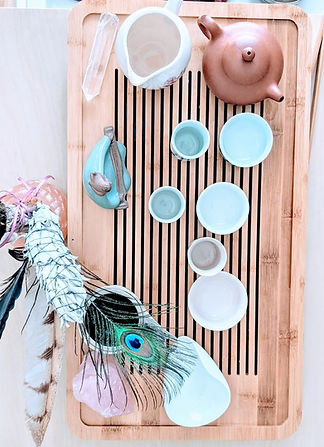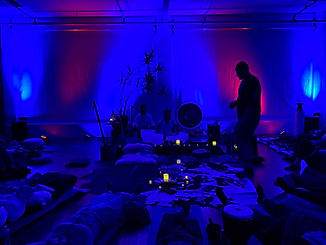
My Services
I perform quantum healing and soul reprogramming through a variety of instruments. Choose your way to experience quantum field healing.
I offer a range of transformative experiences that promote healing and well-being for the mind, body, and soul. My offerings include quantum healing sessions and packages that utilize the power of energy and intention to facilitate deep healing and transformation.
I also offer unique experiences such as sound baths, Sadhu board practices ("bed of nails"), and tea ceremonies, which provide a deeply meditative and introspective space to explore inner consciousness.
Additionally, I offer plant-based medicine ceremonies, which offer a holistic approach to healing by incorporating the wisdom and healing properties of nature. My goal is to provide a safe and nurturing space for individuals to connect with their true selves and find healing and growth.
Get a Quote
To schedule a session or inquire about my healing services, please fill out the requested information below
Sound bath

A sound bath is a therapeutic practice that involves immersing oneself in the soothing sounds and vibrations created by various instruments, such as singing bowls, gongs, chimes, or other resonant instruments. Here are some of the benefits associated with sound baths:
-
Deep Relaxation: Sound baths induce a state of deep relaxation and calm. The vibrations and harmonious tones produced by the instruments can help slow down the heart rate, lower blood pressure, and reduce stress levels. It allows the body and mind to enter a state of relaxation and rejuvenation.
-
Stress Relief: The gentle and rhythmic sounds of a sound bath can help release tension, anxiety, and stress accumulated in the body and mind. The vibrations resonate through the body, promoting a sense of ease, tranquility, and overall well-being.
-
Mindfulness and Meditation: Sound baths can facilitate a meditative state and enhance mindfulness. By focusing on the sounds and vibrations, participants can enter a state of deep presence and heightened awareness, letting go of intrusive thoughts and promoting mental clarity.
-
Emotional Release and Healing: Sound baths have the potential to facilitate emotional release and healing. The vibrations can help release stagnant emotions, promote self-reflection, and create a safe space for processing and letting go of emotional blockages or traumas.
-
Enhanced Creativity and Intuition: The soothing sounds of a sound bath can activate and enhance creativity, intuition, and imagination. It can inspire new ideas, promote clarity of thought, and support the exploration of one's inner world.
-
Energetic Balance and Alignment: The vibrations from sound baths can help rebalance and align the body's energy centers, such as the chakras. The harmonious sounds can promote a sense of energetic flow, harmony, and balance within the body's subtle energy system.
-
Improved Sleep and Relaxation: Sound baths can aid in improving sleep quality and promoting deep rest. The calming and grounding effects of the sounds can help quiet the mind, release tension from the body, and prepare for a restful night's sleep.
-
Increased Self-Awareness and Connection: Sound baths can facilitate a deeper connection with oneself and foster a sense of self-awareness. The sounds and vibrations can help individuals tune into their inner experiences, emotions, and sensations, fostering a sense of inner connection and self-discovery.
It's important to note that the benefits of a sound bath can vary from person to person, and individual experiences may differ. It is recommended to participate in sound baths led by experienced practitioners who create a safe and nurturing environment for the participants.
Standing "Bed on nails" practice

Standing on nails is often associated with a practice called "bed of nails." In this practice, a person lies down or stands on a surface covered with numerous sharp nails or spikes. It may seem counterintuitive, but this practice has been a part of various spiritual and cultural traditions for centuries:
-
Meditation and Mindfulness: Standing or lying on nails induce a state of deep relaxation and focus. The discomfort of the nails can serve as a focal point for meditation, helping individuals cultivate mindfulness and inner stillness.
-
Energy and Healing: Some proponents suggest that standing on nails can stimulate acupressure points, promoting energy flow and balancing the body's energy systems. It helps relieve tension, improve circulation, and support general well-being.
-
Mental and Emotional Effects: The practice is used as a form of self-discipline or a way to conquer fear and build resilience. By voluntarily exposing oneself to discomfort and overcoming the fear associated with it, individuals may experience a sense of accomplishment, inner strength, and mental clarity.
-
Symbolic and Spiritual Significance: For spiritual practitioners, standing on nails represents the ability to transcend the physical and connect with higher realms of consciousness. It can be seen as a symbolic sacrifice, surrender, or purification act.
It's important to note that the practice of standing on nails can be potentially dangerous if not done with caution and under appropriate guidance. It is typically not recommended for everyone, especially those with certain health conditions or vulnerabilities. If you are considering exploring this practice, it is advisable to seek guidance from a knowledgeable and experienced practitioner or teacher who can provide proper instructions and ensure your safety.
Tea Ceremony

The tea ceremony is a highly ritualized and contemplative practice centered around the preparation and serving of tea. It originated in China and was later refined and elevated into an art form in Japan. The tea ceremony holds several benefits, both physical and psychological, for participants. Here are some of the key benefits associated with the tea ceremony:
-
Mindfulness and Presence: The tea ceremony encourages participants to be fully present at the moment and cultivate mindfulness. Every movement, gesture, and action involved in preparing and serving the tea is performed with focused attention and intention, promoting a sense of calm and heightened awareness.
-
Stress Reduction: Engaging in the slow, deliberate, and meditative nature of the tea ceremony can help reduce stress and promote relaxation. The serene and tranquil environment, combined with the soothing aroma and taste of tea, creates a peaceful atmosphere that allows participants to disconnect from everyday worries and find inner calm.
-
Connection and Harmony: The tea ceremony is often conducted in small, intimate settings, fostering a sense of connection and harmony among participants. It provides an opportunity for people to come together, share a moment of quietude, and engage in meaningful conversations. The focus on hospitality and respect for others cultivates a sense of community and interpersonal connection.
-
Appreciation of Beauty: The tea ceremony emphasizes the aesthetic aspects of tea preparation, including the tea utensils, the tea room's design, and seasonal decorations. Participants are encouraged to appreciate the beauty in simplicity, imperfection, and the transient nature of things, fostering an appreciation for the present moment and the beauty in everyday life.
-
Cultural and Spiritual Enrichment: The tea ceremony is deeply rooted in Japanese and Chinese culture and philosophy, embodying principles such as harmony, respect, purity, and tranquility. Engaging in the tea ceremony provides an opportunity to learn about traditions, aesthetics, and spiritual practices, offering a deeper understanding of culture and values.
-
Mind-Body Connection: The tea ceremony can promote a sense of well-being by integrating the physical, mental, and spiritual aspects of the participants. The act of preparing and serving tea requires precise and controlled movements, enhancing physical coordination and focus. The calming and meditative qualities of the ceremony can also have a positive impact on mental and emotional well-being.
Plant-based medicine ceremony


Plant-based medicine ceremonies involve the ceremonial and intentional use of various medicinal plants for healing, spiritual exploration, personal growth, and transformation. These ceremonies are rooted in indigenous traditions and have been practiced for thousands of years in different cultures around the world. Here are some key aspects and benefits associated with plant-based medicine ceremonies:
-
Sacred and Ritualistic Setting: Plant-based medicine ceremonies are typically conducted in a sacred and ceremonial setting, creating a safe and supportive environment for participants. Ceremonial practices, such as smudging, chanting, drumming, or prayer, are often incorporated to establish a connection with the divine, ancestors, and plant spirits.
-
Healing and Transformation: The medicinal plants used in these ceremonies contain psychoactive compounds that can induce altered states of consciousness. These altered states can facilitate deep introspection, emotional processing, and the surfacing of subconscious patterns or traumas, leading to healing and transformation on various levels.
-
Spiritual Connection and Insight: Plant-based medicine ceremonies are often seen as a means to connect with the spiritual realm, gain insight, and receive guidance. Participants may have profound spiritual experiences, expanded states of consciousness, and a deep sense of interconnectedness with nature, the universe, or higher powers.
-
Self-Exploration and Personal Growth: Plant medicine ceremonies provide an opportunity for individuals to explore their inner selves, confront suppressed emotions or beliefs, and gain a deeper understanding of their identity, purpose, and relationship with the world. It can be a catalyst for personal growth, self-reflection, and the integration of new insights into one's daily life.
-
Emotional and Trauma Healing: Plant-based medicine ceremonies can support the healing of emotional wounds, trauma, and unresolved issues. The plant medicines can bring buried emotions to the surface, allowing participants to process and release them in a supported and held space. This can lead to emotional catharsis, greater self-acceptance, and emotional well-being.
-
Community and Connection: Many plant medicine ceremonies are conducted in group settings, fostering a sense of community, support, and shared experience. Participants often form bonds and create a supportive network that can extend beyond the ceremony itself. The communal aspect provides a sense of belonging and facilitates the integration of insights and experiences.
It's important to note that plant medicine ceremonies should be approached with respect and caution and under the guidance of experienced and trained facilitators. These ceremonies can be intense and may not be suitable for everyone, especially individuals with certain medical conditions or mental health concerns. Prior preparation, integration support, and following ethical and legal guidelines are essential aspects of responsible engagement with plant-based medicine ceremonies.



